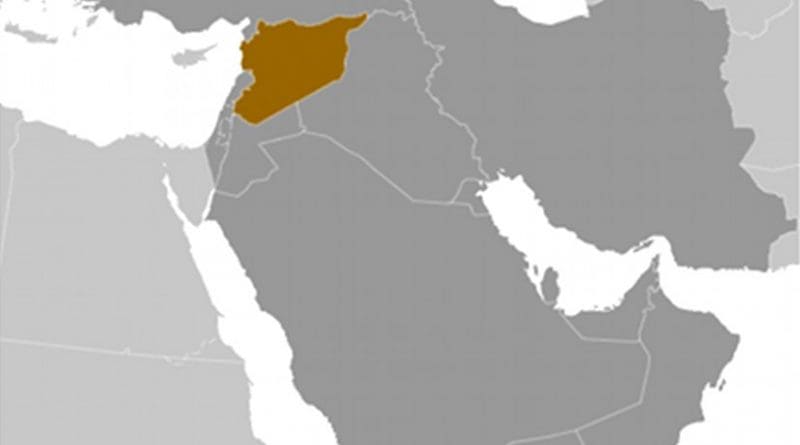The United States Takes A Wait-And-See Attitude In Syria – OpEd
The air over the eastern part of the Middle East is thick with political posturing and empty words. Seemingly, the American superpower is returning to a narrow focus on its own national interests
This rhetoric serves to camouflage the fact that no one will directly intervene in the bloody conflict between the Assad regime and the Sunni insurgency, which has so far killed at least 30,000 civilians and destabilized the region. Neither Turkey nor Saudi Arabia, and certainly not the United States, are ready to send ground troops; instead they are taking rather a wait-and-see attitude. The Iranians are the only ones doing something about the conflict, as they know quite well what they will lose if Assad’s regime falls. None of the others know what they can win. Consequently, they resort to a swirl of words to hide their inaction.
Meanwhile women and children are being murdered with impunity. Both sides are breaking all the conventions of warfare. The whole world is outraged, but ordinary people remain silent as there is not much they can do. Syrian mortars have killed Turkish civilians along the nearly 900-kilometre long common border. Ankara’s reaction has been to issue a stern warning: “We will do what needs to be done if our border is violated again.”
One of Assad’s aircraft has bombed Aleppo, Syria’s largest city with over 2.5 million inhabitants. Half of the city is now in rebel hands. One bomb landed 10 meters from the entrance of a hospital. A U.S. spokesman said this was “unacceptable.”
Iranian aircrafts are transporting weapons to Assad over Iraqi territory. John Kerry, Chairman of the Senate Foreign Relations Committee and presidential candidate for the Democrats in the 2004 elections, has recently threatened Iraq with a cut in U.S. aid if it does not stop this traffic of weapons. Nuri Kamal Al-Maliki, Prime Minister of Iraq and the secretary-general of the Islamic Dawa Party, has not responded to latest American demands. Understandably, The United States is far away and Iran is just around the corner.
“Unacceptable” was the U.S. administration’s response to events which previously would have evoked pressures for a more robust reaction in Washington, if not a fully-fledged military intervention or the imposition of a no-fly zone.
Even NATO Secretary General Anders Fogh Rasmussen added his voice to the lackluster chorus with his statement that NATO “will protect and defend Turkey,” which actually has the largest armed forces of all members of the collective security organization.
The fact that it is presidential election year in the United States partly explains Washington’s wait-and-see attitude. But in about two weeks Americans will cast their votes and whoever wins the elections – and regardless of Mitt Romney’s rhetoric – this attitude will remain fundamentally the same. It is an expression of a doctrine that has been gradually developing in Washington, in response to the bitter American experience of military intervention in conflicts where vital U.S. interests are not at stake.
The last such case was Libya, where the United States first took the lead when it turned out that European NATO powers were not able to take action against Gaddafi without outside help. The United States, as President Obama put it, led the war “from behind.” But in the case of Syria, Washington has decided to let the civil war continue until it ends in a new balance of power. Once this is accomplished, the United States will take stock of the situation and weigh up its options.
America’s top priority in regional conflicts, according to the doctrine newly in vogue, is to prevent possible damage to American fundamental interests. This should not be construed as meaning that Washington does not care about the outcome of the Civil War in Syria.
A defeat for Assad is tantamount to a defeat for Iran, regarded as America’s main enemy in the Middle East. But Washington now has cold feet following its bitter experience in Iraq and Afghanistan. The words of the old sign found in antique shops: “If your break it, you buy it,” are etched on Americans’ “collective consciousness,” a term coined by the French sociologist Émile Durkheim (1858–1917).
It is easy to get drawn into a conflict, but very problematic to get out. It took a little less than ten years to officially withdraw from Iraq, and not before 5,000 American soldiers and perhaps 100,000 Iraqi civilians had been killed. The withdrawal from Afghanistan, which will ostensibly be complete within two years, will have similar numbers attached to it.
The carnage in Syria may be “unacceptable,” but Washington must come to terms with it. Staying clear of regional armed conflicts is one of the new U.S. doctrine’s building blocks and a fundamental reason why the civil war keeps on going. From Washington’s perspective, Syria is primarily a problem for Turkey, which fears that the conflict might create greater unrest amongst the Turkish Alawites in the southern Hatay province, and encourage the Kurdish rebel movement in Southeast Turkey to step up their fight against the Turkish government.
The outcome of the civil war is also of great interest to Saudi Arabia, which fears that Iran could make geopolitical gains from the conflict. America’s top priority is no longer the Middle East, but the struggle with China for influence in the Far East.
If Turkey and Saudi Arabia decide to intervene they can count on American support “from behind,” but the U.S. will wisely not assume the task of helping Syria get back on its feet. Washington is ready for a multipolar world order, but one in which regional powers must themselves organize the distribution of power according to America’s vital interests.
Overthrowing dictators is a tool that has been removed from Washington’s foreign policy toolkit.

